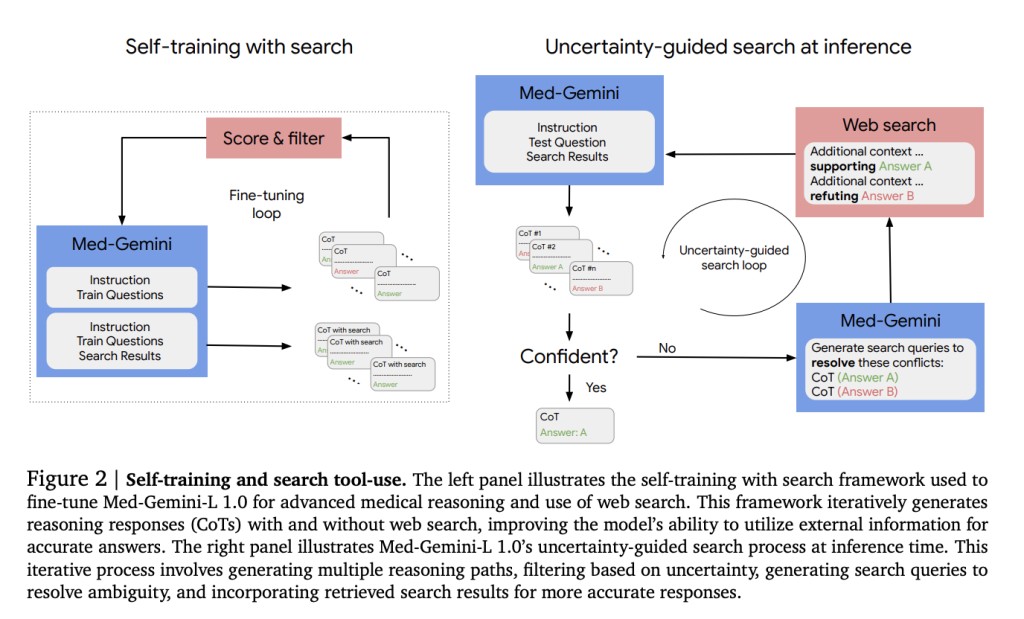Artificial intelligence (AI) in medicine is revolutionizing how clinicians handle complex tasks such as diagnosing patients, planning treatments, and staying current with the latest research. Advanced AI models promise to enhance healthcare by increasing accuracy and efficiency. The vast array of medical data, such as images, videos, and electronic health records (EHRs), challenges AI models to process and interpret effectively. Modern medical practices’ sophistication requires AI to comprehend these modalities and reason about them accurately.
Challenges remain in ensuring that AI models can efficiently analyze medical data. The existing models have difficulty understanding multimodal information, synthesizing long-context records, and accurately retrieving medical information from diverse sources. As a result, medical professionals need AI tools that can understand and analyze medical data efficiently and provide accurate, real-time support.
Large language models (LLMs) exhibit limitations in clinical tasks. They struggle with answering medical questions and processing multimodal data, such as medical images and videos. Their performance in synthesizing data from long-context records such as EHRs remains suboptimal. Therefore, specialized AI tools that better understand medical data are needed to deliver precise and timely assistance in clinical scenarios.
The research team from Google Research, Google DeepMind, Google Cloud, and Verily introduced the Med-Gemini family of models, which extend the capabilities of the Gemini 1.0 and 1.5 architectures by integrating specialized components for medical tasks. Med-Gemini aims to address limitations in current AI models by improving clinical reasoning, multimodal understanding, and long-context processing. This new family of models surpasses previous benchmarks and sets a new standard in medical AI.
Med-Gemini builds on the Gemini architecture by introducing key innovations like uncertainty-guided web search for accurate medical question answering. This is coupled with customized encoders that can process health-related signals like electrocardiograms (ECGs). Med-Gemini also utilizes chain-of-reasoning techniques that help with processing and understanding long-context medical records. These models are fine-tuned to medical needs and can accurately answer complex medical questions by leveraging improved clinical reasoning.
Med-Gemini models demonstrated significant advances in performance, achieving state-of-the-art results on 14 benchmarks spanning 25 tasks. They outperformed GPT-4 and Med-PaLM 2, reaching 91.1% accuracy on the MedQA (USMLE) benchmark, surpassing Med-PaLM 2 by 4.6%. The models also excelled in multimodal tasks, with substantial improvements in analyzing medical images and videos and accurately retrieving information from long health records. On the MedQA (USMLE) benchmark, Med-Gemini’s performance shows a substantial improvement, indicating its capability for accurate medical reasoning.
In conclusion, Med-Gemini addresses the challenges of advanced clinical reasoning, multimodal data processing, and long-context understanding in AI models for accurate medical assistance. Med-Gemini significantly enhances the interpretation of complex medical data by leveraging uncertainty-guided web searches, custom encoders, and chain-of-reasoning techniques. These achievements underscore Med-Gemini’s potential to revolutionize healthcare delivery through more intuitive, accurate, and effective AI tools.
Check out the Paper. All credit for this research goes to the researchers of this project. Also, don’t forget to follow us on Twitter. Join our Telegram Channel, Discord Channel, and LinkedIn Group.
If you like our work, you will love our newsletter..
Don’t Forget to join our 41k+ ML SubReddit
The post Google DeepMind Introduces Med-Gemini: A Groundbreaking Family of AI Models Revolutionizing Medical Diagnosis and Clinical Reasoning appeared first on MarkTechPost.
Source: Read MoreÂ
